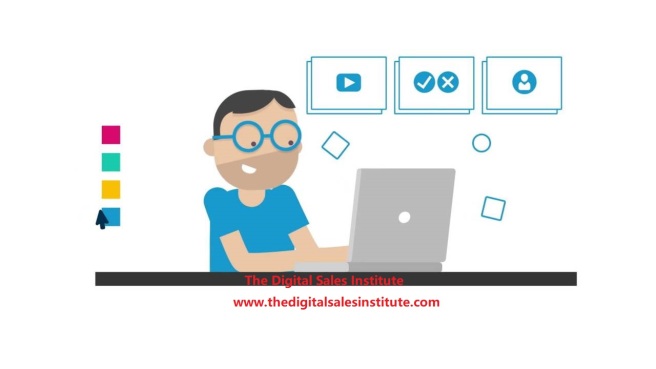Free sales training lesson with video, a sample from the sales skills 101 online sales training program courtesy of The Digital Sales Institute.
Source: Free Sales Training Lesson – The Digital Sales Institute
Free sales training lesson, materials and sales training videos from The Digital Sales Institute. We constantly post a range of Free sales training resources for salespeople, business owners, and entrepreneurs to take their sales skills and understanding of the sales process to the next level.
In today’s digitally influenced selling environment, salespeople must fine tune and constantly refresh their sales prospecting, presentation, value propositions, closing techniques etc in order to close more deals. Investing in online sales training programs is one way to boost sales results.
For more free sales training lessons see our Free Sales Training Video blog or visit our showcase on Sales Training at Vimeo
Free Sales Training Lesson Tips
Up and Over and Yes
This is a simple method to measure your progress (and credibility) in your sales activity.
UP. Up is measured in effort, the effort you put into each sale step.
OVER. Over is measured in “Yes’s” how quickly they move through the buyers journey (from step to step)
Every sales opportunity recognizes the effort it takes to get to a “YES”. However, no matter how hard you work; if you can’t get to “YES” you are only going up. You’re working hard, but getting no closer to the deal – which means you have still to: Met their need, prove that you understand their business, build intrigue, captured their attention, demonstrate value, established confidence, proved it works, proved it is better, that your solution can address their pain.
Yes points are like mini-sales in the sales process.
Knowing what you’re selling (where in the sales process) IN the moment is critical. Is the YES a YES to an appointment? Is the YES a YES to a phone call? Is it a YES to an introduction to the CFO? You have to know what you are selling IN the moment, because it is these “Over” events that go towards closing a deal. Nearly every sales opportunity requires multiple sales “YES” to get to the end.
YES’s only come when the customer or prospect is participating in the sale: when they are working with you
- Respect the fact a sales cycle is NOT linear.
- Manage the selling effort to align with the each YES.
- Know the customer’s buying process.
- Align your sales process accordingly.
- Without a “YES” you are going UP not OVER so no closer to the close.
- The customer or prospect has to work too.
- Always have an “ask” for the prospect.
- Active buyers, buy, passive buyers do not!

Free Sales Training Lesson – The Sales Process
The modern sales process and the steps in selling is focused on how buyers’ behaviors are changing with the rise of digital engagement and purchasing, and the impact this is having on sales roles across both B2B (business to business) and B2C (business to consumer) channels. These changes require many of us to step up and really bring to the fore our very best-selling skills in conversations, getting commitments, showing empathy, displaying kindness, ideas generation, problem solving, creativity and delivering real value.
When it comes to the steps in selling for meaningful interaction and conversations, whether it be B2C or B2B sales, buyers are expecting a much more sophisticated experience from salespeople.
The B2B Buying and Selling Puzzle in the Sales Process.
- Buyer profiles have never been easier to identify but harder to engage and sell to
- They value of genuine relationships as being critical to the buyer/seller relationship
- The average B2B transaction is getting smaller but is taking longer to sell
- In a competitive world, 82% of sellers still fail to differentiate themselves
Buyers want to deal with Subject Matter Experts, not just vanilla salespeople. So salespeople need to train themselves to become subject experts, as to help buyers move forward toward their goal and make a purchasing decision.
Believe it or not, salespeople also need to learn how to sell, maybe that is why you are watching this free sales training lesson. Modern selling requires everyone to learn how to communicate, have relevant conversations, sell themselves effectively and ethically. Which brings is on to the sales process.
A sales process is a set of repeatable steps that a salesperson takes to take a prospective buyer from the early stage of awareness to a closed sale.
Simply put, it is a prospects or customer’s journey from realizing they have a need for a product to making an actual purchase.
And since the sales process is a journey for a customer, it is a road-map for a salesperson.
Typically, a sales process consists of 5-8 steps: Prospecting, Preparation, Approach, Presentation, Handling objections, Closing, and Follow-up.
Sales is a process and the following are components must be managed:
A. Communication skills in terms of discovery questioning and active listening are vital.
B. Making sure that all sales conversations contribute to building commitments and Yes points..
C. Manage the sales process through all the steps.
D. Build a credible and compelling solution for the customer.
E. Link the benefits of the solution with the exact needs of the customer.
F. Handle objections professionally using logic and proof.
G. Watch out for and recognize influencers, users and decision makers.
H. Pay attention to buyer roadblocks, commitments and actions.
I. Frame the closing of the sale appropriately to the buying group.
J. Use the closing technique that suits the situation.
K. Asking for the business.
We hope you enjoyed this free sales training lesson, a $11.99 subscription will give you access to all our online sales training programs. Click here to REGISTER.



